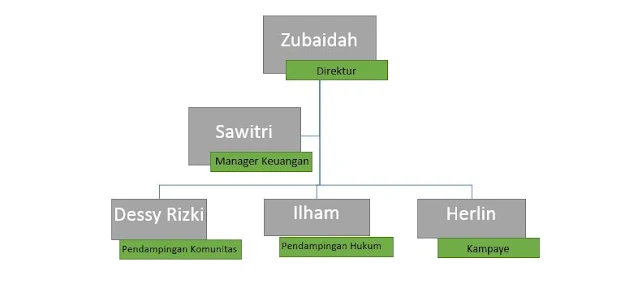"No merun, no food." This statement reflects Mek Nuraini's disappointment. She can no longer cultivate rice as she once did by using the traditional merun-burning method, due to the ban enforced by Jambi Provincial Regulation Number 2 of 2016, aimed at preventing and controlling forest and land fires
Mek Nuraini, a descendant of the Inner Sembilan Indigenous People, feels very afraid to continue opening up land using the merun practice. Her fear stems from frequent encounters with police patrols and security forces monitoring fires near their homes and gardens.
To provide for her family's food needs, Mek Nuraini had no choice but to collect oil palm bunches to earn money for rice. She worked 2-3 days to gather a sack of oil palm weighing around 30-50 kg, which she sold to collectors for Rp. 50,000-70,000. However, the earnings were insufficient to afford rice priced at Rp. 155,000 for 10 kilograms, forcing her to depend on her child's income from working on other people’s plantations
Before the burning ban, Mek Nuraini was able to harvest rice annually by planting local rice varieties such as puteh, rimbo rice, and talang rice, which thrived on burnt land. These rice varieties matured in about 7 months, yielding approximately 7-8 tons per hectare.
“To determine the right time to start burning, we plant banana trees. When the banana leaves grow to the size of a pot lid, it signals that the land is ready to be cleared and ploughed,” explained Mek Nuraini.
In the past, Indigenous women of the Batin Sembilan community traditionally practiced rice planting through shifting cultivation as a natural way to prevent pests. If farming continued on the same land in the next seasons, controlling the abundant growth of wild grass would become challenging. However, with the growing expansion of immigrant plantations and restrictions on company-owned areas, the practice of shifting cultivation has been abandoned.
Mek Nuraini, along with thousands of families from the Batin Sembilan indigenous community, cultivated rice and various food crops on their customary land, which they successfully reclaimed from Ecosystem Restoration Concession (ERC)
In 2015, an agreement was made to establish boundaries between ERC Corporation and the indigenous community, covering 15,000 hectares. However, to this day, no steps have been taken to finalize the boundaries or conduct field verification. Moreover, the community has yet to receive full recognition from the state.
"In history, merun has never caused large-scale fires. We have always protected nature, unlike the widespread fires on plantations and company-owned lands," said Mek Nuraini.
However, when a fire occurs, the community always bears the loss. If a fire happens within the concession area, the company receives compensation in the form of tree seedlings. On the other hand, when fires occur in the community's gardens, there is neglect, and the state provides no compensation. This conflict is bound to escalate, especially amid growing climate concerns framed as efforts to protect the area and save the climate.
Tampilkan postingan dengan label Profile. Tampilkan semua postingan
Tampilkan postingan dengan label Profile. Tampilkan semua postingan
Kamis, 26 Desember 2024
No merun, No food
Desember 26, 2024
Sabtu, 29 Februari 2020
Profil Beranda Perempuan
Februari 29, 2020
Tentang Kami
Beranda Perempuan didirikan sejak tahun 2010 telah memiliki Badan Hukum Yayasan Pada Nomor Notaris IM. Oka Mahendra NR,S.H, M, kn. dengan Nomor AHU-0416.ah.02.01.2010.
Beranda Perempuan lahir sebagai respon terhadap tindakan Kekerasan berbasis gender (GBV) yang merupakan ekspresi paling ekstrim dari hubungan gender yang tidak setara dalam masyarakat. Berakibat pada pembatasan perempuan untuk berpartisipasi penuh dalam sosial, ekonomi dan politik.
Beranda Perempuan memandang kekerasan berbasis gender, akan semakin memburuk pada praktik kemunduran/sumber daya alam yang menurunkan daya hidup masyarakat termasuk dalam kaitannya kepemilikan, akses dan pengunaan manfaat dari sumber daya alam.
Karena itu, alih-alih memperlakukan GBV sebagai masalah yang terpisah dan terisolasi, harus ditempatkan dalam konteks problem struktural dengan menjadikan korban sebagai penyintas, aktor dan agen perubahan dengan fokus pada pemberdayaan perempuan dan anak perempuan.
Untuk itu dibutuhkan serangkain pengorganisasian berbasis komunitas dengan pintu masuk melalui intervensi program ekonomi, layanan kesehatan reproduksi, pendampingan korban dan pendidikan akses tata kelola sumber daya alam sebagai upaya untuk mengatasi dan mengurangi resiko kekerasan berbasis gender.
Visi
Misi
1. Memperjuangkan pengakuan hak-hak perempuan dan komunitas dalam pengelolaan sumberdaya alam yang berkeadilan dan lestari, hak atas kesehatan dan lingkungan yang aman serta penghidupan yang berkelanjutan.
2. Mempromosikan pengetahuan dan pengalaman komunitas masyarakat dan perempuan dalam pengelolaan sumberdaya alam berdasarkan tradisi dan kearifan lokal.
3. Meningkatkan upaya pencegahan dan penanggulangan segala bentuk kekerasan terhadap perempuan berbasis gender dalam relasi personal dan relasi negara.
4. Membangun jaringan kerja dengan aktor-aktor sosial di berbagai level dalam rangka mendukung kerja-kerja Beranda Perempuan
Pendiri Yayasan Beranda Perempuan
Beranda Perempuan diatur Dewan yang terdiri dari individu-individu yang bertindak dalam kapasitas pribadi mereka. Dewan adalah institusi yang ikut menyusun dan menyetujui arah perencanaan dan program serta memantau tata kelola keuangan organisasi

Eksekutif
Eksekutif adalah tim kerja yang bertugas melaksanakan program kerja harian organisasi. Tim kerja akan berkonsultasi dan bertanggung jawab langsung kepada dewan. Dengan keberagaman, Beranda Perempuan berfungsi secara kolektif dengan sistem manajemen horizontal dan pengambilan keputusan secara partisipatif.
Tim Relawan Save Our Sister’s
Aliansi Save Our Sister adalah
Aliansi beranggotakan Seniman, Advokat, Wartawan, Dosen peyintas. Aliansi yang
dipimpin oleh Beranda Perempuan ini memiliki keanggotaan yang bersifat cair
dalam kegiatan kampaye dan pendampingan untuk mendukung korban kekerasan
berbasis Gender
Para Anggota
1. Jon Afrizal ( Jurnalis Jakarta Post)
2. Ruddiyah ( Dosen Psikilogi Unja)
3. Wenny R ( Akademisi)
4. Neneng Suminar (Peyintas )
5. Ratna Dewi (Seniman dan peneliti)
6. Qoqom ( Tokoh Agama Rohima)
7. Sigit (Dosen Fak Hukum)
Office Addres
Jl. Sunan giri Lrg Ambarawa No 12 A Kel Simp III Sipin Kec. Kotabaru Kota Jambi
Email beranda.perempuan@gmail.com Website berandaperempuan.org
Website: berandaperempuan.org
Langganan:
Komentar
(Atom)







Social Footer